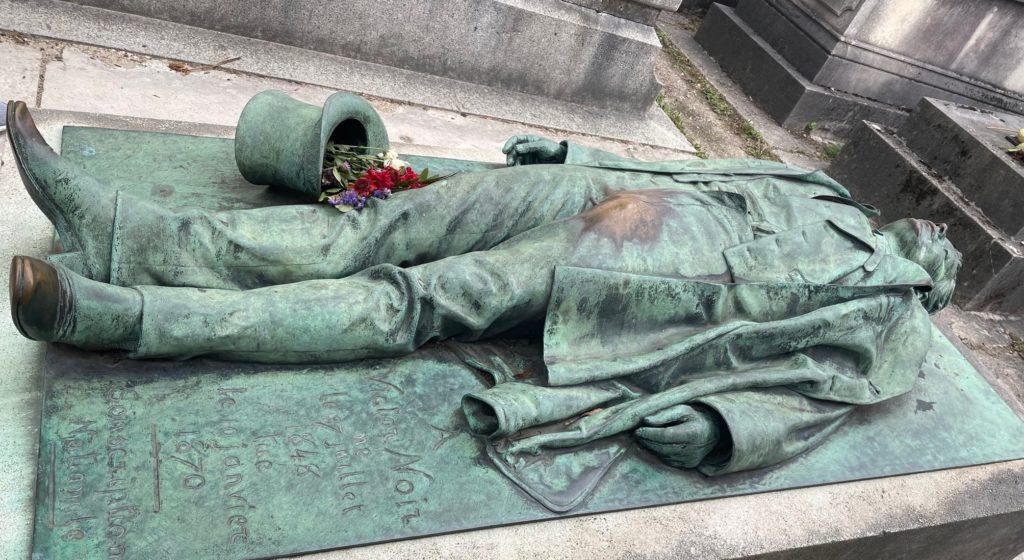Paris is known as the city of light. The city of love. The city of massacres, if you look at the darker side of Paris’ history. But it recently occurred to me that Paris could also be known as the city of superstitions. There are countless superstitions attached to sites and monuments all throughout the city. Some will bring you good luck and fertility, while others will bring you bad luck and the ability to walk through walls. Below are my favourite superstitions to be found in Paris.
The Tomb of Allan Kardec
Allan Kardec, real name Hippolyte Léon Denizard Rivail, was famous for being the founder of Spiritualism. Today, he is buried in the Père Lachaise Cemetery, where his tomb attracts plenty of attention. Superstition says that if you rub the neck of his bust while making a wish, your wish will come true. The caveat is that once your wish has been granted, you must return to his tomb with flowers. To this day, Allan Kardec’s grave is consistently covered with flowers from those who are fulfilling that promise.
The Passer Through Walls
Tucked away in a corner of Montmartre, there is a statue of a man emerging from a wall. This statue is in honour of Marcel Aymé’s famous short story, Le Passe-muraille, about a man who one day wakes up with the ability to pass through walls. According to superstition, if you are able to pull this man’s statue out of the wall, you will inherit his gift. I don’t know of anyone who has succeeded just yet, but the polished hand of this statue is testament to the countless people who have tried.
Salut Montaigne!
The Latin Quarter of Paris has famously been the home of universities and their students for centuries. And while nothing can beat a good study session in order to do well in your exams, the students of Paris have a back up, just in case. Across from the Cluny Museum, there is a small square with a statue of Michel de Montaigne sitting with his legs crossed. Superstition has it that if you rub his right shoe and greet him with a “Salut Montaigne!”, you will do well on your exams.
Place Dalida
Dalida was one of the world’s most popular and famous singers. She sang in 10 different languages and sold over 140 million albums in her lifetime. Dalida lived in her beloved Montmartre for most of her life, and after her death in 1987, Montmartre honoured her by creating Place Dalida, complete with a magnificent bust of the singer in the centre. Today, that bust is the site of some superstitions involving Dalida’s breasts. Rub one and you will receive good luck. Rub the other and you will receive bad luck. The trick is that no one knows which belongs to which, so most people rub both, just to be sure. And yes, this superstition predates the MeToo movement.
The Grave of Victor Noir
Least you think it’s just women who have inappropriate superstitions attached to their statues, let me introduce you to the infamous tomb of Victor Noir. Noir was a journalist who was shot to death by a cousin of Napoléon III. Noir was buried in the Père Lachaise Cemetery, and a statue of the deceased was placed over his tomb. A statue with a very prominent… bulge in his pants. Today, superstition says that if you rub that bulge, you will be blessed with fertility. And if you want a great sex life? You simply kiss Noir’s lips. Bizarre, I know. But Noir’s lips and groin are both very shiny today, so clearly a lot of people believe in these superstitions.
My Least Favourite Superstition of Paris
Oh the love locks of Paris. My personal least favourite superstition. The love lock craze began back in the mid-2000s after they were featured in a popular Italian movie. The superstition goes that if you and your lover write your initials on a padlock, attach that lock to a bridge, and throw the key into the water, your love will last forever. However, it only took a couple of years for this superstition to get out of hand, and bridges all over Paris began crumbling under the weight of all of the locks.
Today, Paris has systematically removed the love locks and rebuilt the bridges with designs that prevent new locks from being attached. But somehow, people always find new locations and more creative ways to attach the locks. At a huge expense to the city in both damage and removal costs. They are also really ugly. So the next time you’re in Paris, please resist the urge to add your lock to this problem. There’s plenty of other superstitions to take part in.
Laura Moore is a professional storyteller who loves history and the many stories that make Paris one of the most fascinating cities in the world. Join one of her signature tours to learn the story of a city.




